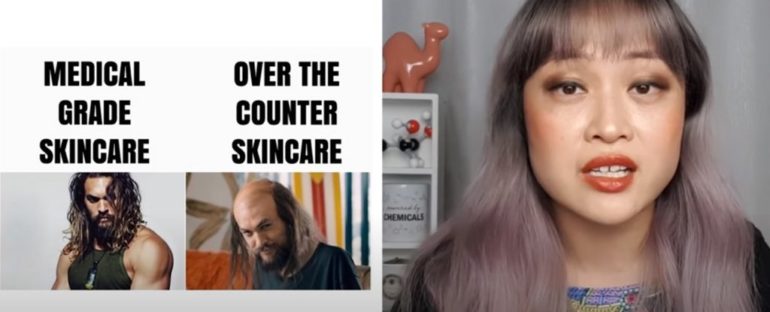By now, we’re all abundantly aware that 2020 has been a tough year. Many of us have been indulging in little acts of self-care just to get through it all – whether it’s a scented candle or a nice face mask. But with all the noise and advertising out there, it can be challenging to work out which products actually work: do you go ‘clean’ or ‘medical-grade’? Do you really need to spend more to see results?
The global skincare market was estimated at US$145.3 billion in 2020, and there’s no shortage of nonsense out there (putting collagen in your coffee, anyone?) Thankfully, we can always turn to scientists to help us sort fact from fiction – and a researcher has just broken down one of the most expensive myths for us.
“There is a lot of misinformation about ‘medical grade’, or ‘clinical’, or ‘professional’ skincare products online,” says chemist Michelle Wong in a recent video on her YouTube channel, Lab Muffin Beauty Science.
“You might have heard that these premium-priced products, that you can usually only get from dermatologists or skin clinics, are guaranteed to be more effective, or better, or less ‘toxic’ than drugstore or so-called over-the-counter (OTC) products that you can get from the supermarket and from the pharmacy.”
However, most of these claims simply aren’t true. Not only is this salon-only skincare not regulated any differently, it’s also not backed by any special clinical evidence or studies.
Estheticians vocal about the supposed benefits of the products they sell may even end up telling people they are “ruining their skin” with so-called OTC skincare, but, as Wong points out, many of the claims used to promote this stuff are basically myths.
“I believe they think that medical grade skincare is better, but I think it’s unethical to promote it based on these myths about regulations that are very easily busted,” Wong told ScienceAlert.
“I think it’s also fear-mongering, which I hate, especially fear-mongering to make people feel like they need to buy more expensive products.”
She points out that the marketing claims surrounding this fancy, expensive skincare only available from professionals are not unlike the language we see around ‘clean’ eating and organic foods – even though everything we eat is chemicals.
“I’m not saying that medical grade products are bad or that they’re not worth the price – a lot of them are really good and a lot of clinical brands do invest in research and hiring scientists who can make their formulations really effective,” Wong says in the video.
“It’s perfectly fine to use and promote medical grade skincare; it’s not okay to promote them using myths, or to harass people who aren’t using these products.”
According to her, much of the misinformation surrounding these products stems from the varied quality of education that estheticians, who are skincare specialists but not medical professionals, receive.
“I’ve had a lot of estheticians tell me that when I talk about a myth, that’s exactly what the esthetician school taught them,” she told ScienceAlert.
“And then other estheticians tell me their school is a lot more nuanced on that particular topic. It varies across the board.”
There’s a lot more detail in Wong’s video that you can watch above – delving into things like FDA regulations and the types of skincare that are regulated as drugs, or do require a prescription.
The good news is, if you do end up going for more affordable skincare with evidence-based ingredients, not only do you not have to worry about ruining your face, you’ll have money left over for a nice candle, too.



